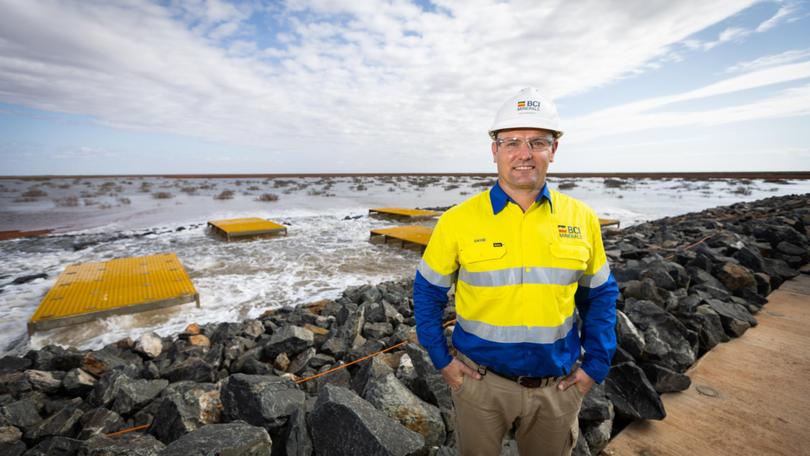BCI Minerals’ $1.4 billion Pilbara project worth its salt as first ponds filled

Australia’s first salt project in more than two decades is well on the path to production in a milestone tipped as a massive coup for northern WA and efforts to diversify the State’s economy.
BCI Minerals on Thursday turned on the taps to start filling the Mardie project’s first three evaporation ponds with seawater, in what marks a key step towards the $1.4 billion operation’s target of churning out 5.3 million tonnes of high purity sodium chloride, or industrial salt, a year.
The David Boshoff-led company marked the occasion with a ceremony in the Pilbara, attended by WA Premier Roger Cook, Federal Resources Minister Madeleine King and WA Mines Minister David Michael.
Sign up to The Nightly's newsletters.
Get the first look at the digital newspaper, curated daily stories and breaking headlines delivered to your inbox.
By continuing you agree to our Terms and Privacy Policy.It comes two weeks after Mardie — located among sprawling mud and salt flats 80km south-west of Karratha — received long-awaited environmental approvals from Federal Environment Minister Tanya Plibersek to begin filling ponds one, two and three.
Mr Cook said on Thursday it was an important milestone for BCI and WA.
“This is the first solar salt project to be constructed, and operating in 25 years, and it’s a bloody big one. The biggest in Australia,” Mr Cook said.
And despite it being a far from straightforward two-year journey from turning the first sod in 2022 to where the listed business’ flagship is today, BCI managing director Mr Boshoff is upbeat about Mardie’s future.
“Australia hasn’t developed a salt project of this significance in 25 years, and the Mardie project will be Australia’s largest solar salt project and the third-largest globally,” he said.
“With the projected growth in demand for high-grade industrial salt in our target Asian markets, BCI Minerals is strongly positioned to supply global markets with Mardie salt for generations.”
BCI chair Brian O’Donnell said filling the ponds was a pivotal moment for the company.
“BCI Minerals has worked closely with all State and Federal government regulators and appreciates their support over the years to enable BCI Minerals to reach this point,” he said.
“The financial support from the Northern Australia Infrastructure Fund and Export Finance Australia is a critical part of our funding package, and we look forward to continuing to work closely with government to deliver a great, sustainable and responsible project for Australia.”
NAIF has tipped in a $490 million loan for BCI.
Ms King said the project would play a significant role in Australia’s transition to a net-zero economy.
Australia hasn’t developed a salt project of this significance in 25 years, and the Mardie project will be Australia’s largest solar salt project and the third-largest globally.
“Salt is a key input to industrial manufacturing and is part of the energy transition, as a key mineral in the development of clean technologies, including solar panels and battery systems,” she said.
“Not only is this operational commencement moving our country in the right direction to lead on the use of our natural resources, but also advancing the region’s future economic diversity.”
Nearly all of the energy required to produce salt comes via wind and solar, both of which are abundant resources in the Pilbara. Its environmental credentials are also boosted by the fact the salt comes from a near-infinite resource: the ocean.
And the race is now on for BCI to get the first cargoes of salt loaded and bound for offtake customers by the second quarter of FY27.
After the first three ponds are filled, BCI will update its groundwater monitoring and management plan to resubmit to State and Federal environmental regulators to start filling the remaining evaporation ponds four through to nine.
The whole Mardie operation is halfway through construction. About 750 workers will be required for construction and 150 will run the salt-harvesting operation.
Mardie will comprise nine evaporation ponds, salt crystallisers and salt wash plant, port facilities and supporting infrastructure.
There are still plans to extract the fertiliser ingredient potash as a by-product of the salt-harvesting process, but that has been put on the backburner until salt operations are under control.
Once harvested, the salt is bound for a loadout facility at Cape Point, where cargoes will be loaded on a custom-built transhipment vessel to carry the produce to a fully operational cargo ship.
The transhipper, built by Montreal-headquartered CSL, has been specifically designed to traverse the shallower coastal waters in a bid to save the costs of trucking tonnes of salt to a full-scale port.
From there, the salt is bound for customers in Indonesia, where the product’s uses will span chemical and industrial applications.
West Australian businessman Kerry Stokes, chair of Seven West Media, has a 35 per cent stake in BCI, and AustralianSuper — the nation’s biggest super fund — has a 31 per cent stake.
Originally published as BCI Minerals’ $1.4 billion Pilbara project worth its salt as first ponds filled
